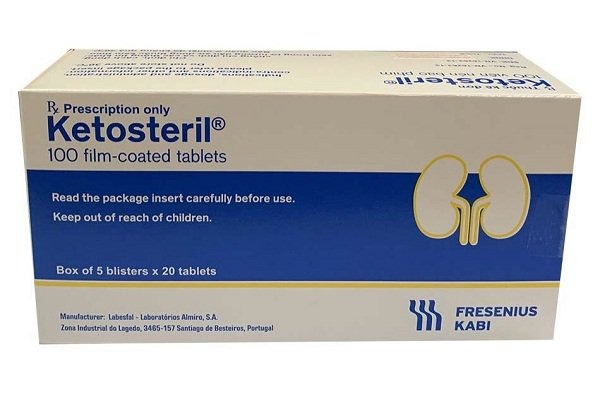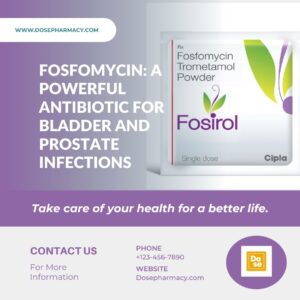Ketosteril Tablet: A Must-Have for Chronic Kidney Disease Management
Chronic Kidney Disease (CKD) is a global health burden that affects millions of people and is on a steady rise...

Chronic Kidney Disease (CKD) is a global health burden that affects millions of people and is on a steady rise due to increased prevalence of diabetes, hypertension, and aging populations. Managing CKD is a multifaceted approach that includes controlling blood pressure, blood sugar, avoiding nephrotoxic agents, and adhering to specific dietary restrictions. One of the most crucial aspects of CKD management is the regulation of protein intake. This is where Ketosteril tablets play a vital role.
Ketosteril, a therapeutic adjunct in the conservative management of CKD, helps delay the progression to end-stage renal disease (ESRD) and the need for dialysis. This article explores the composition, benefits, usage, mechanism, safety profile, and clinical importance of Ketosteril in chronic kidney disease management.
Understanding Chronic Kidney Disease and Protein Restriction
Chronic Kidney Disease is a progressive loss of kidney function over time. As kidney function declines, the ability to excrete waste products, maintain electrolyte balance, and regulate fluid levels deteriorates. One of the byproducts that the kidneys struggle to eliminate is urea, a result of protein metabolism.
A low-protein diet (LPD) is often recommended for CKD patients to reduce the accumulation of nitrogenous wastes. However, protein is essential for maintaining muscle mass, immune function, and overall health. The challenge, therefore, lies in reducing protein intake without causing malnutrition or muscle wasting.
This is where Ketosteril tablets, a keto-analog supplement, come into play.
What is Ketosteril?
Ketosteril is a brand name for a combination of alpha-keto analogs of essential amino acids. These compounds are structurally similar to amino acids but lack the nitrogen component. When taken with food, they are transaminated in the body into essential amino acids by utilizing the nitrogen from other waste products, thereby reducing the nitrogen load on the kidneys.
Composition of Ketosteril Tablets
Each Ketosteril tablet contains a fixed combination of the following keto-analogues and essential amino acids:
- Alpha-ketoisocaproic acid (Leucine)
- Alpha-ketoisovaleric acid (Valine)
- Alpha-ketoglutaric acid (Glutamic acid precursor)
- Alpha-keto-beta-methylvaleric acid (Isoleucine)
- Hydroxy analog of Methionine
- L-Tryptophan
- L-Histidine
- L-Threonine
- L-Tyrosine
These compounds are specially designed to support nutritional needs in CKD patients without increasing urea formation.
Mechanism of Action: How Ketosteril Works
The primary function of Ketosteril is to reduce the accumulation of nitrogenous waste and support protein nutrition in patients on a restricted-protein diet.
Here’s how it works:
- Transamination: The keto-analogs are converted into essential amino acids in the body by utilizing free nitrogen (such as ammonia or other nitrogen-containing waste), thus preventing the body from using its own muscle protein for nitrogen balance.
- Urea Reduction: Since these analogs do not contain nitrogen, their metabolism results in less urea formation, helping to lower the burden on kidneys.
- Correction of Metabolic Abnormalities: Ketosteril helps correct metabolic acidosis and imbalances in calcium and phosphate, which are common in CKD.
- Delaying Dialysis: By improving nutritional status and reducing metabolic waste, Ketosteril can slow the progression of kidney disease, delaying the need for renal replacement therapy.
Clinical Benefits of Ketosteril in CKD
1. Delays Progression to ESRD
Several clinical studies have shown that combining Ketosteril with a low-protein diet can significantly delay the progression of CKD and the onset of dialysis. Patients have demonstrated better preservation of glomerular filtration rate (GFR) and slower progression of kidney damage.
2. Improves Nutritional Status
By providing essential amino acids without nitrogen load, Ketosteril prevents protein-energy wasting — a common complication in CKD. This helps maintain muscle mass and strength, particularly important in elderly patients.
3. Reduces Uremic Symptoms
Patients taking Ketosteril report fewer uremic symptoms such as nausea, vomiting, fatigue, and confusion, due to reduced urea and toxin buildup.
4. Corrects Metabolic Disorders
It helps in managing calcium-phosphate balance, reducing hyperphosphatemia and improving bone mineral metabolism — crucial in preventing CKD-mineral and bone disorder (CKD-MBD).
Recommended Dosage and Administration
Dosage
The typical dosage of Ketosteril is:
- 1 tablet per 5 kg body weight per day, usually around 6–8 tablets daily, divided into three doses.
The dosage may vary depending on the severity of the disease, protein intake, and the patient’s weight.
Administration
- Always taken with meals, to ensure proper transamination and absorption.
- Must be combined with a low-protein diet (0.6 g/kg/day) for maximum effectiveness.
- Should be used under medical supervision with regular monitoring of renal parameters, serum urea, creatinine, electrolytes, and acid-base balance.
Side Effects and Precautions
Side Effects
Ketosteril is generally well-tolerated, but some patients may experience:
- Nausea or gastrointestinal discomfort
- Hypercalcemia (due to calcium salts in the formulation)
- Allergic reactions (rare)
Precautions
- Hypercalcemia should be monitored regularly.
- Should be avoided in pregnancy and lactation, unless prescribed.
- Calcium supplements or high-calcium diets should be adjusted to prevent overload.
- Requires strict adherence to a low-protein diet, or its benefits may be reduced.
Ketosteril vs. Other Amino Acid Supplements
What sets Ketosteril apart from conventional amino acid supplements is its non-nitrogenous nature. Unlike regular amino acid supplements that can increase nitrogenous waste, Ketosteril helps in nitrogen recycling, making it a superior option for CKD patients.
Moreover, Ketosteril has been specifically studied and formulated for kidney disease — with clinical trials and endorsements from nephrology guidelines, especially in Europe and parts of Asia.
Real-World Usage: What Do Doctors Say?
Many nephrologists globally consider Ketosteril an essential part of conservative CKD management — especially in non-dialysis stages (CKD stages 3–5).
According to the KDOQI guidelines, dietary protein restriction is effective in slowing CKD progression, and Ketosteril enhances adherence by preventing malnutrition. It’s often used in:
- Patients waiting for transplant
- Elderly patients who are unfit for dialysis
- Early-stage CKD patients with rapid decline in GFR
Availability and Cost
Ketosteril is available in tablet form and is manufactured by Fresenius Kabi, a global healthcare company. While it’s more commonly used in Europe, Asia, and some Middle Eastern countries, its availability in North America may be limited and usually requires a prescription.
It can be expensive for long-term use, which is a consideration for many patients. However, in countries where it’s included in national health programs or insurance, it is widely prescribed as standard CKD therapy.
Patient Testimonials and Experiences
Many CKD patients on Ketosteril have reported:
- Increased energy levels
- Better appetite
- Slower decline in kidney function
- Improved lab parameters (lower urea and creatinine levels)
Patients who combine it with a strict renal diet under dietitian guidance often experience better quality of life and independence, delaying the physical and psychological burdens of dialysis.
Conclusion: Is Ketosteril a Must-Have?
In the evolving landscape of CKD management, Ketosteril has emerged as a cornerstone for patients trying to preserve their kidney function without rushing into dialysis. It offers a scientifically backed, nutritionally balanced, and kidney-friendly approach to tackling the metabolic challenges of CKD.
While it is not a cure, Ketosteril — when used under medical supervision alongside a controlled protein diet — can slow disease progression, prevent complications, and enhance life quality for those living with chronic kidney disease.
Therefore, for patients, caregivers, and clinicians navigating the complexities of CKD, Ketosteril is indeed a must-have in the therapeutic arsenal.



